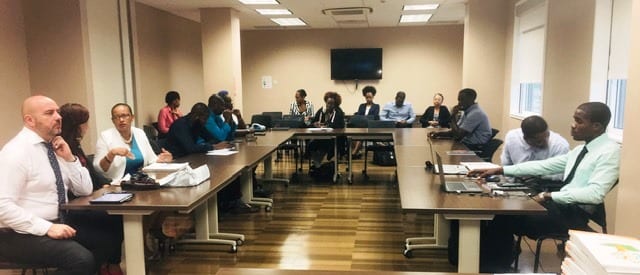
How to identify and ‘crackdown’ on the threats of the illegal wildlife trade is the focus of a national training workshop taking place this week.
Acting Permanent Secretary in the Ministry of Environment and National Beautification, Anthony Wiltshire, stated that the major objective of the workshop entitled: Enforcement of the International Trade in Endangered Species of Wild Fauna and Flora Act, is to “expose participants to crucial tools in the fight against illegal trade in wildlife”.
“It will also introduce them to the various international mechanisms available to assist in their efforts to review, regulate and monitor international trade in wild flora and fauna,” he said.
Fauna and Flora International Programme Officer (Caribbean), Isabel Vique disclosed that the workshop, which was also held in St. Lucia and in St. Vincent and the Grenadines, is funded through the United States Agency for International Development. She explained that it “seeks to create a cross-sectoral approach” which is critical to the implementation of the Convention on International Trade in Endangered Species of Wild Fauna and Flora (CITES).
Biodiversity, Conservation and Management Section Senior Environmental Officer, Kim Downes-Agard, said: “Agencies such as the Customs and Excise Department, Plant Quarantine Unit and Veterinary Services Division are responsible for implementing document control at ports-of-entry, in order to ensure the authenticity and validity of CITES permits and certificates during the import/export process….
“Agencies such as the Royal Barbados Police Force, Barbados Coast Guard and Barbados Defence Force also play important roles in the execution of the provisions under this legislation in their role as law-enforcement and national security officers.”

Law Enforcement Specialist, Justin Gosling, who is the instructor at the week- long workshop declared that “things in the wildlife trade have changed quite significantly over the last five years … and the way that the world sees wildlife crime is that it is now a serious transnational organized crime.”
Mr. Gosling noted that Barbados and the rest of the world needed to “up our game” to better tackle the issue of wildlife trade. He said the workshop would address topics which should improve Barbados’ efforts. These include: International Mechanisms (CITES, INTERPOL, WCO); Warrants of Search, Seizure and Arrest (application and powers); Search Techniques and Smuggling Concealment Methods.
CITES is an international, legally-binding agreement between governments, and aims to ensure that trade in species does not threaten their countries’ survival. Barbados, as a party to CITES since 1992, is obligated to regulate trade in species listed on the Convention’s Appendices. To facilitate the honouring of its obligations under CITES, Barbados enacted the International Trade in Endangered Species of Wild Fauna and Flora Act, CAP. 262 in February of 2006.
US Fish and Wildlife are also supporting the workshop, and it is expected that Barbados will benefit tremendously, with respect to biodiversity conservation.
